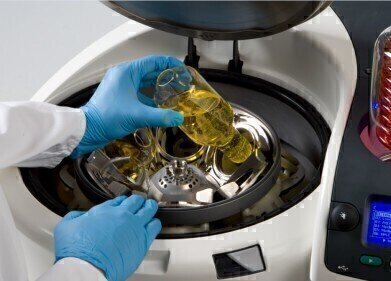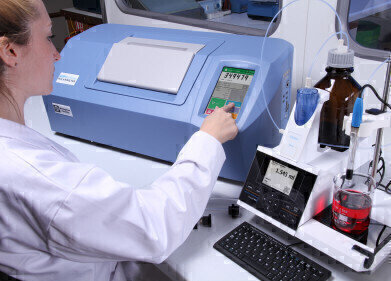-
 ACQUITY UPC2 System with ACQUITY QDa Detector.
ACQUITY UPC2 System with ACQUITY QDa Detector. -
 ACQUITY UPC2 System with Xevo® TQ-S.
ACQUITY UPC2 System with Xevo® TQ-S. -
 ACQUITY UPC2 System with ACQUITY UPLC® ELS, ACQUITY UPC2 PDA, and ACQUITY QDa detectors.
ACQUITY UPC2 System with ACQUITY UPLC® ELS, ACQUITY UPC2 PDA, and ACQUITY QDa detectors. -
 ACQUITY UPC2 System with Xevo® G2-XS.
ACQUITY UPC2 System with Xevo® G2-XS.
Chiral
ACQUITY UPC2 System and Columns
Jan 30 2015
ACQUITY UPC2 System and Columns
Using inexpensive and non-toxic compressed liquid CO2 as a primary mobile phase, the ACQUITY UPC2® System gives scientists the ability to precisely vary mobile phase strength, pressure, and temperature. With this ability to fine-tune the resolving power and selectivity of the system, scientists can exercise better control over the retention of analytes for separating, detecting, and quantifying structural analogues, isomers, and enantiomeric and diasteriomeric mixtures – all compounds that are often a challenge to separate by any other means.
Convergence Chromatography
In 2012, Waters introduced UltraPerformance Convergence Chromatography™ (UPC2®), a category of separation science that provides an exceptional increase in selectivity to the chromatography laboratory. UPC2 is a holistically-designed chromatographic technology that uses compressed CO2 as the primary mobile phase to leverage the chromatographic principles and selectivity of normal-phase LC while providing the ease-of-use and method development simplicity of reversed-phase LC.
Tracing UPC2 back to its SFC origins, supercritical fluid chromatography exploited density differences of liquefied gases in a supercritical state. This technique has evolved to include the use of co-solvents in a sub-critical state. As it has been discovered that liquid CO2-based chromatography can be performed in either supercritical or subcritical states, a new descriptor is required. ‘Convergence chromatography’ is the term used by Waters to cover this modern form of analytical and preparative techniques.
The miscibility of CO2 with a wide range of polar and non-polar organic solvents has made the liquid CO2-based mobile phase versatile enough to separate a much wider range of compounds than reversed-phase chromatography, especially for mixtures containing very hydrophobic and/or polar compounds. Not only can CO2-based mobile phases be used with both polar and non-polar stationary phases, but the chromatography can be influenced by modulating solvent gradients with a much wider choice of columns (including chiral columns) using the same mass spectrometry-compatible co-solvents.
The unique feature of convergence chromatography is not the state or the condition of the solvent, but rather the ability to combine – or converge – the separation of a much wider variety of compounds with one chromatographic system.
Retention Mechanisms in Convergence Chromatography
Convergence chromatography has similar retention mechanisms to normal-phase chromatography in that it generally elutes compounds from column stationary phases according to their polarity in the mobile phase. In reversed-phase chromatography, polar compounds are eluted first, often causing separation challenges. In convergence chromatography, however, polar compounds are retained and elute last.
The powerful orthogonal capability of normal-phase separations is elevated to a mainstream technique with the use of compressed liquid CO2 as the primary mobile phase in convergence chromatography. This allows the use of gradients across the widest polarity range and brings full mass spectrometry detection capabilities into everyday laboratory use. The separation of most compounds and mixtures that are soluble in organic solvents is made possible. More than that, compounds that are often a challenge to separate by any other means such as structural analogues, isomers, and enantiomeric and diastereomeric mixtures are now simpler and easier to separate using convergence chromatography.
ACQUITY UPC2 System with ACQUITY QDa Detector
The standard 8/15 column screening system using PDA detection is being used in both chiral and achiral analysis labs. Adding the Waters ACQUITY QDa® Detector and ACQUITY Isocratic Solvent Manager allows for a much higher level of confidence with peak tracking and troubleshooting that makes method development so challenging.
With the significantly increased levels of orthogonality achieved with convergence chromatography, this mass detection-based system designed for routine use is becoming an essential everyday tool for chiral and achiral analysis.
ACQUITY UPC2 with Xevo TQ-S
Analysis within the realm of bioanalysis/DMPK requires the highest levels of resolution, sensitivity, and efficiency. The addition of ACQUITY UPC2 Technology to the DMPK lab can address many areas of concern for reversed-phase DMPK separations, such as:
polar compound or metabolite retention
fast generic gradient chiral methods
chiral metabolite separations
orthogonal separation analysis to reversed phase, either for compounds of interest or matrix interferences
ACQUITY UPC2 with Triple Detection
Extended capability of a system that offers the most in screening and detection comes in the form of the
ACQUITY UPC2 System with triple detection.
This method development tool provides maximum column and solvent screening while also providing the best in detection capability. When the analysis challenge includes compounds of interest with no UV chromophore or lack sample ionisation, the ability to add a third, evaporative light scattering detector to the system can be critical in ensuring that nothing is overlooked.
ACQUITY UPC2 with Xevo G2-XS
The use of an ACQUITY UPC2 System with QToF technology provides scientists with the tools to address complicated analysis area such as lipids or natural products.
Taking advantage of the wider separation of convergence chromatography, polar and nonpolar compound classes such as lipids can be addressed with a simple switch of column and gradient conditions to provide accurate mass with high resolution. A system solution designed to:
identify
quantify
confirm
Digital Edition
Lab Asia 31.6 Dec 2024
December 2024
Chromatography Articles - Sustainable chromatography: Embracing software for greener methods Mass Spectrometry & Spectroscopy Articles - Solving industry challenges for phosphorus containi...
View all digital editions
Events
Nov 27 2024 Istanbul, Turkey
Jan 22 2025 Tokyo, Japan
Jan 22 2025 Birmingham, UK
Jan 25 2025 San Diego, CA, USA
Jan 27 2025 Dubai, UAE


















